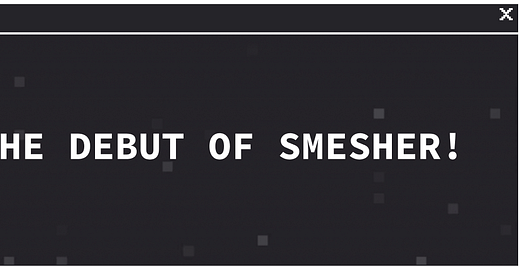Hi there, and welcome to the first Smesher newsletter. If you are a person who believes that technology should serve humanity, then Smesher is the newsletter for you. Get inspired by stories of individuals and groups, in activism, art, thought-leadership, technology and crypto, who work towards a more just, equal and compassionate society.
Smesher is a newsletter by Spacemesh, but not about it. We hope you’ll find it interesting and inspiring, and would love to hear your thoughts. Just hit Reply to write to us.
Team Smesher
Quote of the week

The reason we find this quote relevant (despite the boys-club vibe), is because to us, it sounds like it’s about taking responsibility when you are one of the privileged ones. In crypto, we feel responsibility has failed to become a top priority. Mostly in the environmental aspect, but not just.
Question:
Do you know any crypto projects that demonstrate a high level of responsibility or accountability? If you do, tell us about them. Hit Reply to write to us.
Hero of the week
Marina Ovsyannikova seems like an obvious choice to be anyone’s hero. The former employee of Channel One TV in Russia, who burst into the live news broadcast to protest the war on Ukraine, risking 15 years in prison, is an immediate role model. However, the reason we find her especially fit to be a crypto-world hero is not just her courage and self-sacrifice, but her motivation: fighting for truth and transparency. And, last but not least, her modus operandi: hacking, defiance and challenging the status quo.
Article of the week; further perspective
To put Ovsyannikova’s actions into further perspective, that goes beyond the war on Ukraine, we recommend this demonstration of good ol’ investigative journalism: Greg Miller and Joseph Menn of The Washington Post wrote about how Putin brought Google and Apple to their knees. This story helps to grasp the scope of what Ovsyannikova, and anyone believing in free speech in Russia, is up against:
In a single year, Putin had his political nemesis Alexei Navalny imprisoned after a poisoning attempt failed to kill him; pushed independent news outlets to the brink of extinction; orchestrated a Kremlin-controlled takeover of Russia’s Facebook equivalent; and issued “liquidation” orders against human rights organizations.
Amid this internal offensive, Putin also moved to bring foreign technology companies to heel. Moscow deployed new devices that let it degrade or even block Russians’ access to Facebook and Twitter, imposed fines totaling $120 million on firms accused of defying Kremlin censors, and ordered 13 of the world’s largest technology companies to keep employees in Russia and thus exposed to potential arrest or other punishment for their employers’ actions — a measure that U.S. executives refer to as the ‘hostage law’.
What can you do; organization of the week
If all this makes you feel helpless, and you want to do something without risking 15 years in prison, we recommend getting acquainted with The Open Observatory, more commonly known as OONI.
This NGO monitors online censorship (i.e. which websites are blocked in different countries), through their free open-source software, which you can download to your phone and desktop. You can run it to see which websites are blocked in your own region (heads up; it can’t work with your VPN), or help monitor blocking of networks like Facebook and Twitter in other regions (let’s say… Russia). You can also add sites you think might be suffering from censorship to their lists, for others to monitor. Or you could use their research tools to help learn and spread the word about this topic.
Want to learn more about this in-depth? Here’s a deck by OONI, and here’s a one-hour zoom we had with Maria Xynou of OONI
Artist of the week: Nikita Kadan, Ukraine
This photo is not an artwork, though it is by an artist; Nikita Kadan, from Ukraine. It’s important to learn though, that times of peace can also be challenging for an artist in Ukraine. In April 2018, Kadan participated in an exhibition called Educational Acts, which was shuttered on its opening day.
The show, which took place at a gallery affiliated with the National Pedagogical University in Kyiv, focused on violence employed by right-wing groups, with some works dedicated to the LGBT community and their uneasy situation in Ukraine, and other works reconsidering the topic of identity and violence. Kadan was one of the artists participating in the exhibition who had their artworks confiscated by police, and never returned to the artists.
Kadan continued to present his work around the world, including a current exhibition in Miami, presenting Ukrainian artworks, which became unpredictably timely.
Our goal is to provide you with the tools and resources you need to thrive in the crypto-sphere while helping cultivate a more equal and compassionate society. We look forward to hearing your thoughts. You can write to us by clicking Reply.







( ˃̶̤́ ꒳ ˂̶̤̀ )
Awesome! Looking forward to the next one!